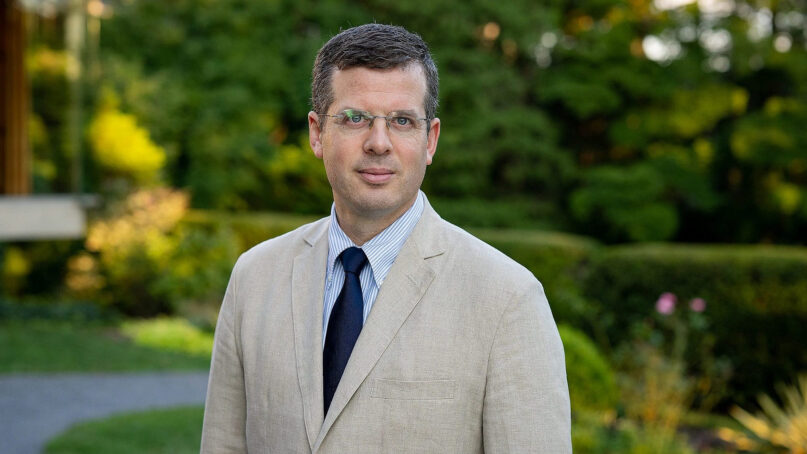
By David Isaac
An Israeli professor at Princeton University says he has become the target of a BDS-like campaign, only with a twist since the attack on him has come from other Israeli professors on campus.
His detractors paint him as a fascist—“anti-democratic, anti-academic”—and lament that someone whose views they see as beyond the pale has been installed as a “scholar and lecturer,” a position that bestows legitimacy and access to freshmen students whom they suggest he will corrupt with his “hateful agenda.”
The target of this broadside, Ronen Shoval, was invited to Princeton for a year starting last September by the school’s James Madison Program in American Ideals and Institutions. His response to the attack, which appeared as an op-ed in The Daily Princetonian on April 25: “There are some things so ridiculous that only an intellectual can believe them.”
“I’m a strong supporter of democracy. I promote those values, which I believe are important for the survival of Western civilization, in general, and Israel in particular. I am disgusted by fascism. I’ve been fighting against it all my life,” Shoval told JNS.
Shoval said the real issue is that he’s a political conservative. “That’s why they try to label me a fascist. A fascist to them is a conservative who is winning an argument.”
He said his opponents want to create “a progressive echo chamber. It completely contradicts the whole concept of a university as a place to discuss a diversity of views.”
Yoram Hazony, a well-known Israeli conservative thinker who attended Princeton as an undergraduate, tweeted on May 2 that “the purpose of the attempt to cancel Shoval is obviously much broader: It is to make sure that conservatives will not be hired to teach anything at institutions like Princeton.”
Asaf Romirowsky, a Middle East historian and executive director of Scholars for Peace in the Middle East (SPME), told JNS his group is concerned about the assault on free speech.
“We consider this an attempt to shut down his viewpoint, analogous to a lot of cancel culture that you’re seeing on American college campuses, but of late, particularly at Princeton,” Romirowsky said.
Originally from Israel
The authors of the attack, Eldar Shafir and Uri Hasson, both originally from Israel, teach at Princeton’s Department of Psychology. They insist, while denouncing Shoval, that it’s not about freedom of speech: “If someone on campus would like to hear McCarthyites or founders of organizations labeled fascist speak, by all means, invite them to speak.”
What makes it “a whole other matter,” they claim, is appointing Shoval as a university lecturer, where he has a podium and “power over students.… When used by bad actors, these privileges can easily facilitate the development of anti-democratic playbooks, maliciously aimed at attacking independent thinkers and academic freedom.”
Shoval said that vague, rather turgid sentence reveals that his detractors know they’re taking a position against free speech. “They’re bending and twisting to find a formula to excuse it. It’s an attempt to justify the unjustifiable.”
Shafir and Hasson’s main objection to Shoval is his past association with Im Tirtzu, a Zionist, grassroots, largely student group he helped found. According to Im Tirtzu’s website, its mission is combating “the campaign of delegitimization” against the Jewish state and “providing responses to post-Zionist and anti-Zionist phenomena.” It boasts 20 branches at universities and colleges in Israel.
However, Shafir and Hasson characterize the NGO as an “ultranationalist Israeli group that has waged campaigns of intimidation and harassment against prominent human rights organizations, academic departments, authors, artists and scholars across Israel for years.”
One of their central arguments against Shoval is that he led a campaign to shut down the political science department at Ben-Gurion University. “It is bewildering to us that someone who fought to close one respectable political science department should be generously hosted by another.”
Shoval said their charge is simply inaccurate.
“About 12 years ago, we put together some research about Ben-Gurion University’s political studies department as it leaned extremely hard left. We took it to the Knesset’s Education Committee, and they said, ‘This criticism sounds reasonable. Let’s take it to the Council for Higher Education and have them put together a professional report about it.’ ”
The Council for Higher Education is an official government body. Among its duties is ensuring quality and standards in Israel’s educational institutions, Shoval said.
The council brought in a neutral party, a Berlin-based political science professor. The 2010 evaluation committee that he chaired expressed concern that Ben-Gurion students were encouraged to become politically active and that “the study of politics as a scientific discipline may be impeded by such strong emphasis on political activism.”
Shoval said, “Based on the report’s findings, the council decided to shut down the department. Im Tirtzu never said close it. We just wanted more diversity of opinion.
Department of BDS
“At the time, Ben-Gurion’s political studies department had 11 professors. Nine out of the 11 supported BDS, or accused Israel of being a colonial state, or called the IDF murderers,” he noted.
(The department’s most widely known academic at the time, Neve Gordon, wrote in the Los Angeles Times in 2009 that an international boycott is “the only way that Israel can be saved from itself.”)
Shoval said he’s proud of his work at Im Tirtzu. At the same time, he stresses that he left the organization 10 years ago and Eldar and Hasson appear to hold him responsible for the group’s activities that took place afterwards. (They refer to a video Im Tirtzu released following his departure, which he posted to his Facebook page, labeling certain “prominent human rights organizations” as “foreign agents.”)
Shlomo Dubnov, an Israeli professor who teaches at the University of California, San Diego and runs the school’s chapter of Scholars for Peace in the Middle East, told JNS: “To call those human rights groups ‘prominent’ as Eldar and Hasson do is a stretch. They all reside on the extreme left. That’s probably one reason Hazony tweeted that the accusations are ‘a jumble of distortions and slanders.’ ”
Dubnov took issue especially with Eldar and Hasson’s efforts to link Shoval with fascism, which they base on a 2013 defamation case brought by Im Tirtzu in which the Jerusalem District Court said the group, not Shoval, might have “aspects in common with fascism.”
“The two professors attacking him neglected to mention that the Supreme Court overturned that district court’s ruling in 2015. A simple internet search should have revealed that to them,” Dubnov said.
Eldar and Hasson declined JNS’s requests for comment.
McCarthyite tactics
“It’s got all the earmarks of an ad hominem attack, where past associations are dragged up in a certain way to smear an individual. They employ McCarthyite scare tactics even as they condemn them. This would be just as upsetting if it were done by the opposing side,” Dubnov said.
“If I were to guess, what’s driving this is the current ferment in Israeli politics over judicial reform. It’s spilling over onto U.S. campuses, which isn’t appropriate.”
Indeed, Shoval said that he likely came on the radar of the two professors, whom he had never heard of given that neither is a political scientist, because of a debate at the campus Hillel center on judicial reform about two months ago.
“Hillel invited two people to speak on the topic, one for and one against. I was in support. I was surprised that something like 50 people came to demonstrate against me. Most of them came from New York. They weren’t part of the university,” Shoval said.
“I was constantly interrupted and they wouldn’t let me finish a sentence. I stayed calm but in the end two policemen had to escort me to my car through the back door. They were worried for my safety,” he continued.
Eldar and Hasson oppose judicial reform, saying one of their objectives in writing the column was to “support our colleagues, the judiciary and democratic institutions in Israel in their current fight for democracy.”
Frustrating to Shoval is that his work at Princeton has nothing to do with current politics.
“My classes are about virtue and the meaning of life in different cultures. My students come up to me now telling me they’ve never felt any bias in my teaching and they had no clue regarding my personal opinions. That, in itself, is gratifying. My goal has been to represent each philosopher and intellectual that I teach through their best arguments, be it Marx or Hayek,” he said.







 Southern New England Jewish Ledger
Southern New England Jewish Ledger















